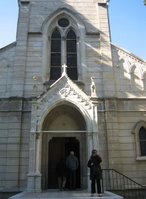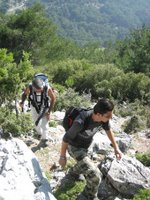
Two weeks from now, I'm going to see the Pope. Just like that.
It's funny how a lot of the more interesting things in life happen through pure serendipity, when all of our concerted effort and forethought might never have made them happen. One sunny Thursday morning I had time on my hands -- one of the many, many mornings here when I've had time on my hands -- and decided to go for a stroll. I meandered through the backstreets of our cozy neighborhood, Bostanlı, and headed towards the district of Karşıyaka, which is the main commercial center on this side of the bay.
It was an entertaining walk. When you have no particular agenda, and no particular time presure, it's amazing the things you can discover simply by strolling through the streets of your own city -- the city you thought you knew. I found shady, tree-lined streets, where the trees were so tall they must have been a hundred years old. There was an antique furniture refinishing shop, where two strikingly good-looking brothers adopted old and mistreated furniture and made it look good again. There was a shop selling local olive oil, an art studio -- students working diligently under the watchful gaze of their instructors. One of my favorite discoveries was a place that was full of massage beds. You know, like those electric massage chairs, only with these, you're lying down. Every bed in the place was taken by portly, balding older men, or plump women in headscarves and baggy flowered
şalvar trousers, and somehow I was so tickled by the scene that I had to stand and watch for a minute.
In a shady, quiet, tree-lined street I made my most interesting discovery. The lovely church of St. Helen -- Karşıyaka's only Catholic church.
I don't know what it is about living in a country that statistically is 99% Muslim, but in the months I've lived here, I've started to feel a tug back towards the faith of my childhood. It has been years since I've been a regular churchgoer or could even call myself Catholic. Perhaps the pull I've been feeling towards the church is cultural as much or more than spiritual. However much distance we may put between ourselves and our early beliefs, somehow they become an inescapable part of us. Most of the time we can't see or feel them, but when we least suspect it, they resurface. When we are surrounded by people who do not share that background or those beliefs, we are reminded of what we've left behind and drawn back towards it.
The church of Saint Helen is infinitely pleasing to the eye. It is small and made of gray stone; sparingly decorated, surrounded by lovely trees. It beckons to the passer-by. After some looking around for someone with a key who could open the high (locked) wrought iron gate in the high stone wall around the church, I was in. Was I projecting my own feelings, or was there a palpable feeling of love and acceptance hanging in the air? Inside that perimeter, I was suddenly a child taken into the arms of a loving parent, safe from the evils of the world. It was a nearly overwhelming feeling. What had my soul been missing? Why had I been so unaware?

I mounted the steps and slowly pulled open the door, prepared to encounter the usual excesses of European Catholic churches -- the kind which I have always felt put off by, in that they seem to encourage contemplation of the material rather than the spiritual. But yet again, a surprise. Delicate arches, pale shades of cream and light blue. One or two delicate, tasteful, barely-gilded artifacts ornamented the church -- and that was all. It was quiet and peaceful, and as I sat down near the front, for some reason unbidden tears rolled down my face. Was it simply the beauty of this space and this moment? Or was something fundamental missing from my life?
As the time drew towards 11:00, the end of the day's 'visiting hours' at the church, I made my way to the door. The man who had originally admitted me stood there, apprently eager for a chat. Not in English, suffice it to say. He seemed very excited that another sheep had come into the fold (a bit prematurely, I couldn't help thinking to myself). We talked about our origins and faith, with me constantly asking him to repeat and speak more slowly, and him constantly getting excited and speaking faster. He wanted me to meet the priest, he said. Come.
Around the back of the church is a vine-covered house. The man I was with shouted something up; an old and benign face appeared at the window. Moments later, the face became a whole person standing at the door, smiling and beckoning me in.
Father Alphonse is from Malta, and has been living in Turkey for 15 years. (Still doesn't speak Turkish, I was interested to learn.) He was a kindly fellow, and we talked for several hours about everything from cockroaches to the demographics of the Christian population in Turkey. He invited me to begin coming to Sunday morning mass at the Cathedral (the existence of which I had not even known about). Apparently there is one, however, and it is in English and frequented mainly by NATO personnel. I told him as kindly as I could that I'd love to, but Sundays wouldn't work due to my regular Sunday hikes. I hastened to reassure him that if I had a Sunday free, I would go. What's more, being in nature is like praying for me; very spiritual, I blathered. I wondered later why I had gone to such lengths to placate this man I barely knew.
The subject of the Pope's impending visit to Ephesus came up. Ephesus, about an hour's drive from Izmir, is an ancient Ionian city and the site of the House of the Virgin Mary -- the place where Jesus' mother Mary is widely believed to have lived out her days. Quite unexpectedly, Father Alphonse asked if I'd like to go see the Pope. Of course I said yes, although perhaps not for the reasons that the good Father might have hoped. At any rate, he put me on the list of passengers riding in his personal bus. So there it is...on November 29, I've got a date with Benedict.






